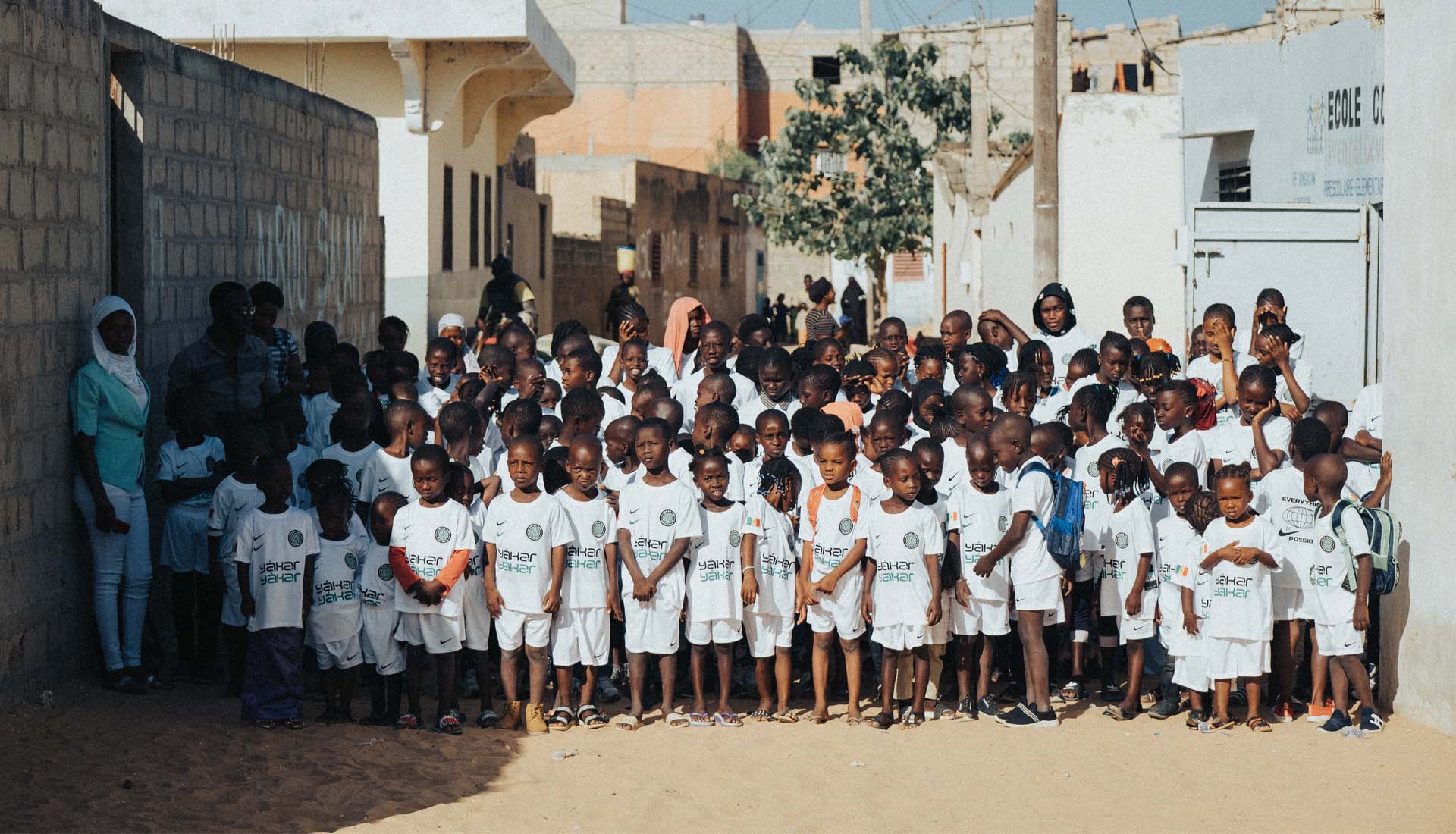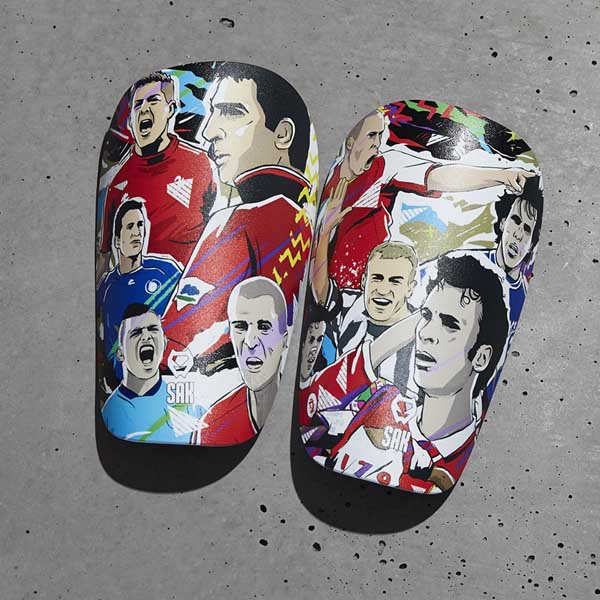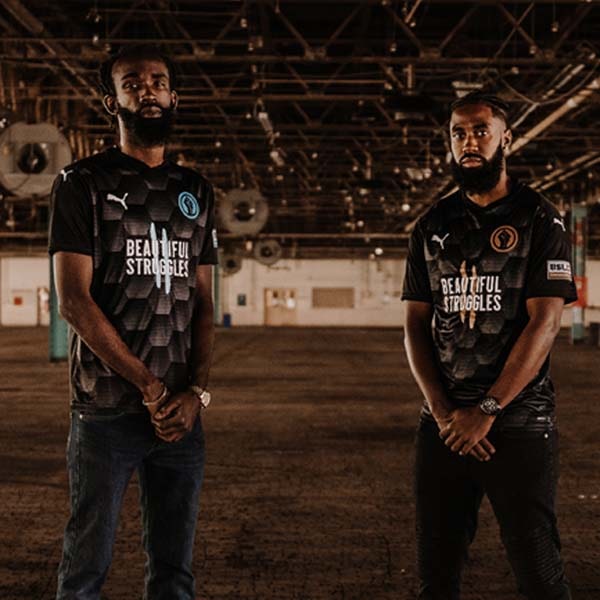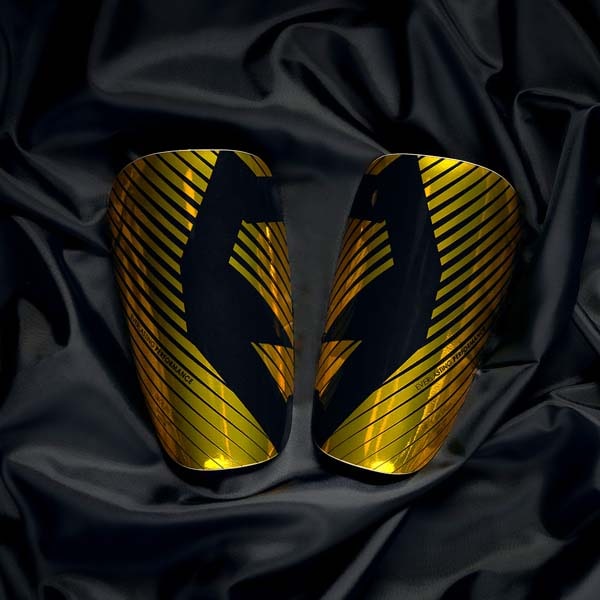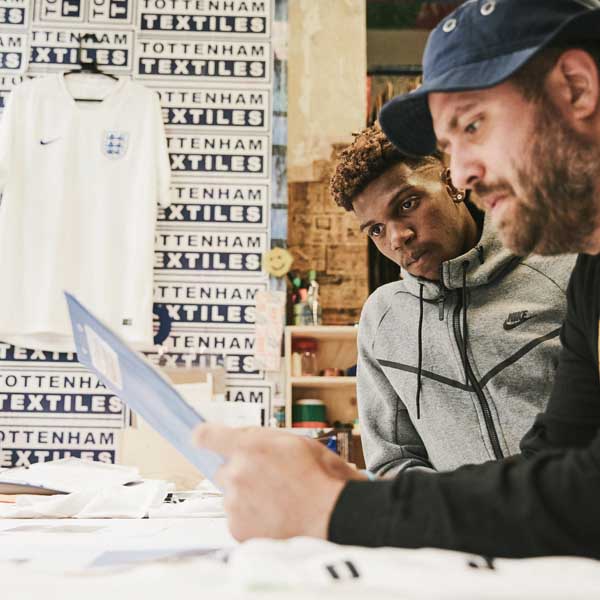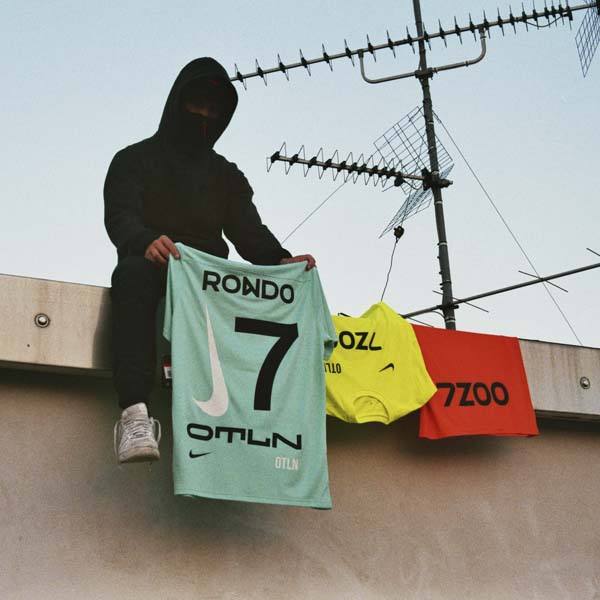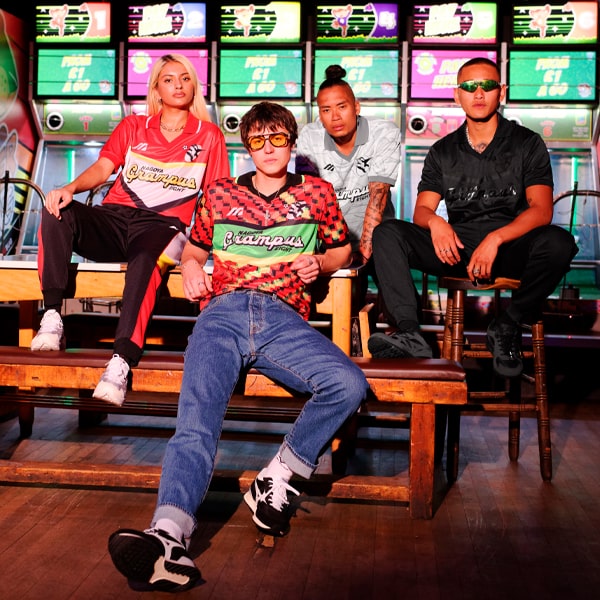The Yakar Project and Nike have combined to drop a limited-edition jersey that will raise funds to improve the lives of young people in Senegal’s ADE School, which makes football a vital part of its pupils’ development.
The inspiring Yakar project aims to improve the daily lives of children at the ADE school in Senegal. Proceeds from the sale of the shirt will go directly towards the cause. In 2015, Jonathan Szwarc went on a humanitarian mission to ADE School (Avenir et Développement de l’Enfant, “Children’s Future and Development” in English). The impact football has on the day-to-day lives of the children, and of this community school, founded by its headmaster Djibril Sané in 2004, really touched him, and planted the seed of an idea. Five years later, the Yakar project was born.
500 specially made football shirts were handed out to the children of the school in November 2020. To spread the word about the project, members of Yakar made a documentary about the life of these children, and their connection to sport. With 150 of these shirts now being available to buy at Pro:Direct Soccer, we caught up with Jonathan, to find out all the incredible story behind the project and the shirts themselves.
Starting from the beginning, where did the idea for the project first come from?
Five years ago I carried out a humanitarian mission at the ADE school (Avenir et Développement de l'Enfant - Child Future and Development ) near Dakar. A school where 500 children from 5 to 15 years old have access to education thanks to Djibril Sané the founder and director of the school since 2004.
I have been deeply touched by the impact of football on these children. I knew that it was a vital sport and very much rooted in Senegalese culture, but over there, I discovered another, deeper side to it. Football helps children in the present. It allows them to forget their daily and school difficulties. Football also has a positive collateral impact for their relatives: their parents and teachers. When they play, the parents know that their children are not just doing anything in the street. For the teachers it is the most effective tool to create strong bonds with their pupils, which is often very difficult to establish in crowded classrooms.
I promised myself I would go back one day and give a little more than my time. After being caught up in their powerful passion, I told myself that it was through sport that I would be able to help them.
At the time, I had noticed a serious lack of equipment to play in good conditions. The children didn't have adapted sports clothing. This was a handicap for them but also for their parents and the school.
Eighteen months ago, I gathered a team of volunteers to create jerseys especially for these children. We created a model of jersey filled with strong symbols, thought to reason in the minds of the children during their childhood and adolescence. Yakar was born.
When did you see it changing from more than an idea and into something real?
There were several crucial steps for Yakar, but Nike France's decision to help me develop the project took it from an idea to a concrete mission. I now had the support of a brand and not the least. It was therefore easier for me to convince all the people essential to the success of the project.
What kind of response did you get when you were starting the project?
I was very lucky because the first people I went to see me directly said yes.
Jérémie and Laura from the design agency Midi:quinze were the first to agree to join the project. They created the jersey from scratch. I am infinitely grateful to them.
It's thanks to their exceptional work that Nike joined the adventure by donating jerseys. Alessandro, a close friend, financed the rest of the project.
The photographers Bishop Nast and Karl Hab immediately agreed to join the adventure as well. These two artists were essential to the project because I really had in mind to present humanitarianism in another form. With a more artistic angle. To stick to my vision, I had to be able to surround myself with talented photographers with very different styles. Their mission would be to sublimate the jersey through shootings.
Finally, Tom Weber - the director of the documentary and Nelson Rosier - the photographer who accompanied me to Dakar are the ones who helped change the Yakar dimension.
These two incredible talents literally took three months of their lives to prepare the project, document it on the spot, and finally edit the documentary in Paris but also all the content for social media.
It is important to understand that Yakar is the result of 18 months of collective and relentless work in Paris. Without all the talents that accompanied me on the project, Yakar would never have existed. Finding these dedicated people was not easy and I took many rejections on my way. One of my greatest pride is in the Yakar team that has been able to help these 500 children through its work. I can never thank them enough.
I wanted to go further and inspire them with the message of hope that Yakar means. I am convinced that reading the word Yakar every time they put on this jersey will have a positive impact on them"
Tell us about the journey in your words, from the early objective to how it developed, what have you been able to do with Yakar?
I believe that in any successful project, a vision is needed at the beginning, even if it is refined over time. Making jerseys has always been my initial goal. It was while discovering the final work of Midi:Quinze that I realised that we could bring a different vision to this humanitarian project centred around sport. The jersey had been designed for the children of Dakar but also to be worn outside the pitch. The idea of creating a different identity was born at that time.
I also wanted to document the project in Dakar but I had to find the right angle so as not to show the distribution of jerseys by young white men to black children. Despite the profound validity of our action, this could have been misinterpreted. It was the meeting with Tom and Nelson that made it possible to define this angle. With their experience they were able to define what the story we would tell through the documentary would be. Once again, it is only a question of the work of the team that follows me.
The positive effect it has had on lives, can you tell us about that?
Djibril Sané says in the documentary: "Yakar is a very important word in Senegalese culture. You will see the fruit of your work in a few years". Even though I think that the real effects of Yakar on children will be seen in the long term, we saw during the distribution of the jerseys how proud the children were to wear it. Several times, kids came to see me to tell me how happy they were to be part of a real team. A sort of bond has been created between ADE's children thanks to this jersey.
I think these jerseys have also been a relief for the teachers. They have never been able to make these kids practice sport with an adapted outfit. Seeing this pride in their eyes was a great victory for us.
What can I say about the emotion I saw in Djibril Sané's eyes. He has been working hard since 2004 to improve the school education of these underprivileged children. His work is extremely hard, with very little means. The covid has made the school's economic situation even more critical. So to see people providing material support while at the same time putting a spotlight on his school has, I think, touched him enormously. He's a hero in the shadows, who you never hear about. This project is also for him.
It must feel incredible to be able to do something so positive like this – what does it take to make something like this a success?
The first question to ask ourselves, in my opinion, is what cause we wish to serve. Why? Because it is easier to have a concrete impact if the cause touches us deeply.
Personally, two causes touch me: children and football. I knew I could do something unique by bringing these two worlds together with my own vision.
The second key is to bring the right people together. Only great teams build great projects. It was the combination of the expertise of the talents that accompanied me and their deep desire to serve a cause they hold dear that made the difference.
The last essential point in this project is perseverance. I went through countless pitfalls before I was able to distribute the jerseys. Some people had given me their agreement to take part in the adventure before withdrawing at the last moment. I also had to deal with bad suppliers. The Covid also blocked all the travels to Africa for many months.
Passion, team, perseverance are the keys to success.
Do you feel like this is just the beginning now?
The distribution of the jerseys is obviously only a first step for Yakar. We wanted to respond first of all to a material insufficiency. The next step for us will be to improve their infrastructure by building a football pitch near the school. This is a project on a completely different scale, which this time will require us to find not only the right partners in France, but also in Senegal.
With the team we have built up and the success of the first stage, it will hopefully be easier to convince financial and artistic partners for the second stage.
More generally, I aspire to create a real humanitarian brand for Yakar. I want it to be distinctive, unique and recognisable by its creativity. Above all, I hope it will help to create a real community ready to help children in real need.
What about the shirts themselves, they're a beautiful by product of this journey – where did the design come from and how powerful a mechanism have they been?
All the credit goes to Jérémie and Laura, the two Midi:Quinze designers who worked for months to create the perfect jerseys. The challenge was twofold. On the one hand, they had to design a real football jersey like that of a real team to inspire ADE's children. On the other hand, I wanted this jersey to be wearable in the city too. Bringing these two ideas together in one concept was not easy.
I could have come to Dakar with 500 white jerseys. They would already have been very useful for the children. I wanted to go further and inspire them with the message of hope that Yakar means. I am convinced that reading the word Yakar every time they put on this jersey will have a positive impact on them.
The badge consists of a lion, the icon par excellence of Senegal. Its mane was made from an African symbol meaning strength. We have embroidered the country's flag on the sleeve and flocked a phrase by Sadio Mané on the back: "Everything is possible" in connection with this message of hope that we want to instil. The swoosh as well as the word Yakar were doubled to indicate the importance of moving forward together. Finally, fine lines have been incorporated on each flocking and recall the narrow streets of Thiaroye.
For all those who will get it, this jersey will have this deep meaning while being a beautiful garment, wearable in everyday life as well as for sports activities.
Many athletes like the professional boxer Bilel Jkitou already wear it for training. The emotion is very strong for us to see him wearing it.
You had them shot beautifully too – it adds to the layers of this – for charitable projects to have such a strong artistic-led story is unique in itself isn't it…
I asked myself the question: why don't humanitarian projects inspire people more when they are carrying extremely important causes? I think it's a combination of factors. Their work to carry out concrete actions is already immensely difficult. Funds are also lacking. Finally, I believe that the artistic and humanitarian worlds are still not very well connected.
For my part, I was convinced that presenting things in a creative way could capture the attention of new people who have not necessarily focused on the humanitarian sector.
My ultimate goal is to raise as much money as possible for the school. So I knew I had to reach as many people as possible. To do this, I decided to shoot the jersey in very different environments.
Bishop Nast brought a very raw side to the photographs by shooting with silver film at his home in Montfermeil. As they say, the suburbs inspire Paris and Paris inspires the world. Even in this shooting, fashion is very present and touches a certain number of people.
Karl Hab, a photographer used to the Paris Fashion Week, brought a very fashionable side to his studio shooting with professional models. These models were not chosen at random because they represent the Parisian mix and they all play football.
Finally, Nelson Rosier, the photographer who accompanied me to Dakar sublimated the jersey by photographing the children wearing it in their everyday life. His pictures are phenomenal. Many will be shared in the coming weeks on our Instagram account: @yakarproject.
It's this mix of very different photos that I believe make Yakar's DNA and has touched people.
Making a documentary to support this...was that always the plan? Can you tell us about that? How proud of the film are you and what did you want to present through this?
I always wanted to document the Yakar project but I didn't know what angle to take. It was meeting Tom Weber, the director that changed everything. He was able to put into images what was fundamental: listening to the children talk about the impact of sport in their lives but also hearing their teachers and parents express themselves on this subject.
I wanted people to discover this other side of football. The aim of this documentary is to show that football is much more than a way of getting your family out of poverty, although it is a reality that you can only see.
Finally, it seeks to show its impact on women and the work that is still necessary for them to take 100% ownership of the practice of the sport.
It was also essential for us to value this incredible hero from the shadows, Djibril Sané. I wanted people to see how much he has dedicated his life to providing education to so many children.
My pride is immense. It is the concretisation of a long term work and above all the way for everyone to see very easily why Yakar exists.
This film was directed by a young director with exceptional talent, who already works with major brands. He will go very far. Tom Weber knows how to do literally everything. During our mission in Dakar, he would never stop filming: sometimes with his camera, then with his drone, and finally using his Gopro. I almost had trouble following him... The result is exceptional and symbolises this first stage of the project in the most beautiful way.
Where do you want to take Yakar next?
The next step in Yakar is the construction of a football pitch near the school. Giving hope to these children can't stop at these jerseys. We can do even more and we will do it in the coming months.
I invite all the people touched by this project to buy the jersey as all the funds will be donated to the school (prodirectsoccer link) or to give what they can from the jersey jackpot created for the occasion (Gofundme link). Even 1€. This will be used to serve our mission to help children through sport.
I also aspire to grow the Yakar team with other talents who will put their expertise to this project to help the children.
I would like to take this opportunity to say thank you to all the exceptional people who helped me in one way or another on this first stage of Yakar: Alessandro, Jérémie, Laura, Tom, Nelson, Caroline, Rudy, Karl, Bishop, Aboudou, Thierry, Audran, Pere, Nicolas, Marguerite, Pierre-Benoit, Léo, Gabriel, David, Charlène, Margaux, Maxime, André, Joséphine, Louise, Ragnar, Tito, Nikki, Houssem, Abou, Pete and Oussama.
Pick up the Nike Yakar Project Shirt at prodirectsoccer.com
